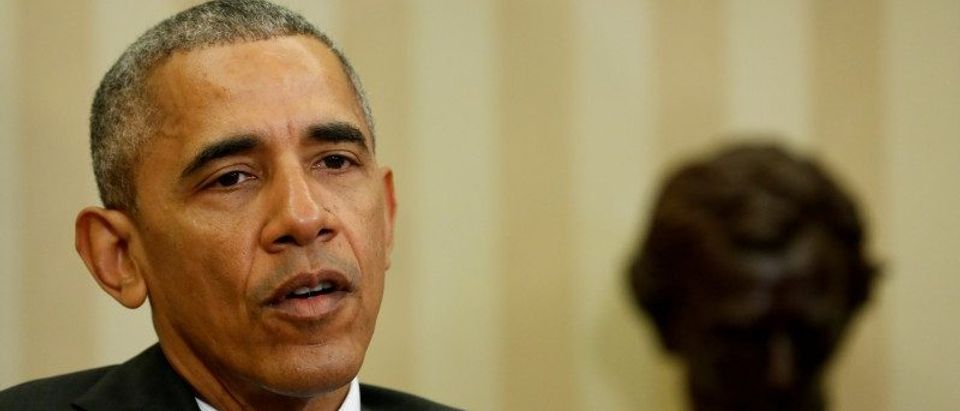President Barack Obama’s lack of a response to Chinese provocations in the South China Sea may be sending a troubling message to America’s partners in Asia.
The Chinese People’s Liberation Army Navy (PLAN) seized a U.S. Navy unmanned underwater vehicle (UUV) operating legally in international waters outside of China’s nine-dashed line, a previously discredited demarcation, Thursday.
The Department of State, as well as the Pentagon, demanded that China return the drone. China agreed; however, it is unclear when, where, and how the exchange will occur.
The Chinese Ministry of National Defense (MND) blamed the incident on the U.S., accusing the U.S. of spying on China inside China’s waters and inappropriately hyping up the situation.
China warned the U.S. against engaging in surveillance activities in the South China Sea. Some Chinese military officials and scholars claim the seizure was intended to teach the U.S. a lesson.
The U.S. issued a formal complaint over the arguably unlawful seizure, but it did not take additional action.
“Diplomatic protests [are] not enough,” asserted Michael Auslin, resident scholar and director of Japanese Studies at the American Enterprise Institute, “A toothless US response will only embolden further belligerence on Beijing’s part.”
The Obama administration failed to respond with strength to an unlawful act of aggression. As the U.S. did not take action to protect its own navy, America’s Asian allies and partners may question whether the U.S. will stand by its security agreements.
China has been consistently emboldened by the current administration’s lack of resolve.
Prior to the drone seizure incident, a Center for Strategic and International Studies (CSIS) Asia Maritime Transparency Initiative (AMTI) report revealed that China has installed military equipment on all seven of its artificial islands in the Spratly Islands, in clear violation of Chinese President Xi Jinping’s public promise to Obama that China will not militarize the South China Sea.
“China appears to have built significant point-defense capabilities, in the form of large anti-aircraft guns and probable close-in weapons systems (CIWS), at each of its outposts in the Spratly Islands,” the report explained.
The Chinese government argued that building military installations does not constitute militarization.
“China’s deployment of necessary defense equipment to its own territories has absolutely nothing to do with militarization,” Ministry of Foreign Affairs spokesman Geng Shuang said in response.
Throughout Obama’s presidency, the U.S. has failed to properly address the growing challenges from China’s maritime militia, a paramilitary force masquerading as civilian fishermen. The maritime militia harassed the USNS Impeccable in 2009, shadowed the USS Lassen in 2015, and has been involved in several other incidents.
The lack of response to the seizure of U.S. naval equipment by the Chinese navy is the latest example of inaction. Some experts argue that U.S. allies are unlikely to find this comforting.
“Allies and observers will find it hard not to conclude this represents another diminishment of American authority in the region,” Vice President for Studies at the Carnegie Endowment for International Peace Douglas H. Paal stressed to the New York Times.
“This is China showing that it is in the process of setting the rules in the South China Sea,” Alexander Vuving, an expert on Vietnam and the Asia Pacific at Center for Security Studies explained to NYT reporters. “If China can get away with this incident with impunity, this will send a chilling message to countries in the region.”
“We will not allow a shared domain to be closed down unilaterally no matter how many bases are built on artificial features in the South China Sea,” Adm. Harry Harris, head of U.S. Pacific Command, explained at the Lowy Institute Wednesday. “We will cooperate when we can but we will be ready to confront when we must.”
“Capability times resolve times signaling equals deterrence,” he said.
“The weak link is resolve,” argued Euan Graham, the director of international security at the Lowy Institute after the drone incident. “Capability, yes. Signaling, yes … But, the muted response means the equation falls down on resolve.”
Send tips to ryan@
All content created by the Daily Caller News Foundation, an independent and nonpartisan newswire service, is available without charge to any legitimate news publisher that can provide a large audience. All republished articles must include our logo, our reporter’s byline and their DCNF affiliation. For any questions about our guidelines or partnering with us, please contact licensing@dailycallernewsfoundation.org.












